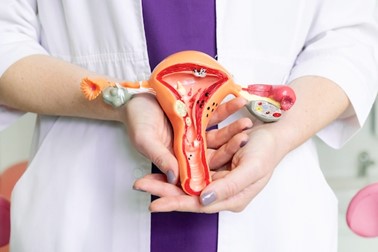A common growth that develops either inside or on the surface of the ovaries, typically containing fluid or semi-solid material. They vary in type and often remain asymptomatic, resolving spontaneously without medical intervention. ovarian cysts can lead to complications that necessitate medical attention. Regular pelvic examinations are essential for detecting and managing potential issues associated with ovarian cysts.
Types of Ovarian Cysts
Most ovarian cysts are functional, linked to the natural menstrual cycle processes, and usually resolve on their own within a few months. Non-functional cysts include cystadenomas, dermoid cysts, endometriomas, and occasionally ovarian tumours, which require closer monitoring due to their potential for complications.
Symptoms and Causes
The primary cause of ovarian cysts is ovulation, though factors such as abnormal cell growth, endometriosis, or pelvic inflammatory disease can contribute. Symptoms can vary widely, with smaller cysts often asymptomatic, while larger ones may cause pelvic pain, bloating, discomfort during intercourse, or irregular menstrual cycles.
Diagnosis and Testing
Diagnosing ovarian cysts typically involves pelvic examinations and imaging tests like ultrasounds or laparoscopy. These procedures help determine the cyst's size, location, and nature, guiding appropriate treatment planning.
Management and Treatment
Treatment approaches for ovarian cysts depend on age, symptoms, and cyst characteristics. Options range from monitoring for functional cysts to surgical interventions or hormone medications for larger or symptomatic cysts to regulate ovulation and prevent recurrence.
Prevention
Hormonal contraceptives help to reduce their occurrence. Regular pelvic exams and prompt reporting of symptoms are crucial for early detection and management.
Ovarian cysts are fluid-filled sacs that can form on the ovaries. They are common and often harmless, but some may cause pain or other issues. Regular check-ups help detect and monitor them early. Treatment depends on the cyst's size and symptoms and can range from observation to medication or surgery. Consulting a doctor is important for proper diagnosis and personalized care to manage ovarian cysts effectively and maintain overall health.



